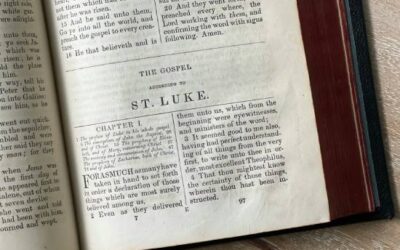What Does the Bible Say About Debt?
Worrying about financial debt can wake us up in a cold sweat.
For many people, debt feels like a necessary part of life. But anyone who’s had suffocating student loans or a mountain of medical bills knows it’s not ideal.
And it can leave us wondering: What does the Bible say about debt? Is debt a sin? Is it normal? Or is it neither?
The Bible says in Romans 13:8, “Owe no one anything, except to love each other” (ESV).
But it also says, “It is well with the man who deals generously and lends” (Psalms 112:5, ESV).
Scripture emphasizes principles on lending and debt forgiveness far more than financial debt.
At the same time, it talks about being a responsible borrower and the consequences of debt.
So even though the Bible wasn’t meant to be a finance manual, we can learn a lot of fitting principles for dealing with debt. So let’s comb through Scripture and discuss:
- Whether debt itself is a sin
- Ten key Bible principles about financial debt
1. General advice to lenders
2. When the Bible says to lend
3. How the Bible says to lend
4. Avoiding usury
5. Stewardship and debt
6. Borrowing and repaying debt
7. Living within our means
8. Co-signing on loans
9. Debt canceling and forgiveness
10. Depending on God vs. debt” - Why it matters for us today
Let’s start with some good news: The Bible doesn’t condemn anyone just for having debt.
And when we look at what Scripture says about financial debt as a whole, God’s loving guidance and goodness shine through.
So let’s start by addressing a common question.
Does the Bible say debt is a sin?

Photo by Kaboompics.com
Here’s the short answer: No. The Bible doesn’t call debt a sin.
It’s especially clear because of how often God encourages lending—which puts people in debt to us. (We’ll cover that in the next section.)
But we also see Bible verses warning that debt isn’t God’s ideal, either:
“The rich rules over the poor, and the borrower is the slave of the lender” (Proverbs 22:7, ESV).
“Everyone who was in distress, and everyone who was in debt, and everyone who was bitter in soul, gathered to [David]” (1 Samuel 22:2, ESV).
Is it any wonder the Bible links debt with bitterness, distress, and slavery? Sounds a lot like how debt feels today, too.
In this sinful world, debt can get us in over our heads. It puts us at the mercy of those who might not have our best interests at heart. It can limit our potential to lead fulfilling lives, provide everything we want to give to our children, or support causes we care about.
But we’ll see that even though debt isn’t God’s ideal, it doesn’t change His love for us or His willingness to help us or work through us.
And He doesn’t leave us to figure it out alone.
In Nehemiah 5, the people of Israel were desperate because of a famine. Many had to mortgage their homes and land—and even send their children as slaves—to pay for food and taxes.
“Now our flesh is as the flesh of our brothers, our children are as their children. Yet we are forcing our sons and our daughters to be slaves, and some of our daughters have already been enslaved, but it is not in our power to help it, for other men have our fields and our vineyards” (Nehemiah 5:5, ESV).
Here’s how Nehemiah responds:
“I was very angry when I heard their outcry and these words. I took counsel with myself, and I brought charges against the nobles and the officials. I said to them, ‘You are exacting interest, each from his brother.’ And I held a great assembly against them” (Nehemiah 5:6-7, ESV).
Nehemiah’s concern is the injustice towards those in desperate need. And he scolds the wealthy in Israel for charging them high interest rates (usury).
We don’t hear Nehemiah disciplining the people who were in debt. He even lends them money and grain himself. (But note, they weren’t taking out debt for luxuries and vacations, but because they were starving.)
So far, we don’t see debt called out as a sin. Isaiah 24:2 even says God doesn’t judge us based on our financial position:
“As with the lender, so with the borrower; as with the creditor, so with the debtor” (ESV).
But we get multiple perspectives of why it isn’t considered a “Plan A.” And we see that the Bible takes a serious stance on how we lend to others.
But that barely scratches the surface. So let’s explore ten key financial topics from the Bible.
Ten Key principles the Bible gives about debt
From the Old Testament to the New Testament, God covers a lot of financial ground.
And it’s practical wisdom we still need today.
The Bible advises on when, how, and who to lend to—and on the responsibility that comes with debt. God teaches stewardship, debt forgiveness, debt-free living, and how to depend on Him.
But first, let’s get the lowdown on lending.
The Bible’s advice to lenders

Photo by Lukas
The Bible often connects lending with generosity. So it’s no surprise that God encourages Christians to lend.
“He is ever lending generously, and his children become a blessing” (Psalm 37:26, ESV).
In the New Testament, Jesus says:
“Give to the one who begs from you, and do not refuse the one who would borrow from you” (Matthew 5:42, ESV).
The Bible also gives precise advice about when and how to lend.
Let’s start with when the Bible says to lend to others.
When the Bible says to lend
It says we’re supposed to lend to those who are poor and in need:
“But if anyone has the world’s goods and sees his brother in need, yet closes his heart against him, how does God’s love abide in him?” (1 John 3:17, ESV).
“If your brother becomes poor and cannot maintain himself with you, you shall support him as though he were a stranger and a sojourner, and he shall live with you” (Leviticus 25:35, ESV).
“If among you, one of your brothers should become poor, in any of your towns within your land that the Lord your God is giving you, you shall not harden your heart or shut your hand against your poor brother, but you shall open your hand to him and lend him sufficient for his need, whatever it may be” (Deuteronomy 15:7-8, ESV).
Something all three verses have in common is their mention of lending to brothers. But what does that mean?
In Nehemiah and Deuteronomy, “brother” refers to those within your community.
And in the New Testament, Jesus says, “Whoever does the will of my Father in heaven is my brother and sister and mother” (Matthew 12:50, ESV).
The Bible says to care for people in need—especially those in our churches and communities.
And that includes our direct relatives:
“But if anyone does not provide for his relatives, and especially for members of his household, he has denied the faith and is worse than an unbeliever” (1 Timothy 5:8, ESV).
But that doesn’t mean that lending to strangers is wrong. We saw in Leviticus that it’s pretty much assumed that everyone will be looking after newcomers and travelers.
But God’s love shines through us when we remember to bless the needy within our reach.
And it’s not only about money. It can mean loaning groceries, cars, time, spare rooms, or whatever you might have that matches the need.
So the answer to “when” is “whenever you have the opportunity!”
Now let’s look at verses that discuss how to lend.
How the Bible says to lend

Photo by Kaboompics.com
The Bible tells us to lend freely, and usually without charging interest (Matthew 10:8, Leviticus 25:36-37).
The next couple verses say it’s okay to charge interest on loans to strangers, but not to people we’re connected with:
“You shall not charge interest on loans to your brother, interest on money, interest on food, interest on anything that is lent for interest. You may charge a foreigner interest, but you may not charge your brother interest, that the Lord your God may bless you in all that you undertake” (Deuteronomy 23:19-20, ESV).
“If you lend money to any of My people who are poor among you, you shall not be like a moneylender to him; you shall not charge him interest” (Exodus 22:25, NKJV).
We’re also supposed to give without expecting or demanding anything back. And give generously (Luke 6:30, Luke 6:35, ESV).
Deuteronomy 15:10-11 points out why God encourages us to lend. Because until the end of the world, we’ll always find people in need:
“You shall give to him freely, and your heart shall not be grudging when you give to him, because for this the Lord your God will bless you in all your work and in all that you undertake. For there will never cease to be poor in the land. Therefore I command you, ‘You shall open wide your hand to your brother, to the needy and to the poor, in your land’” (ESV).
Usury in the Bible
The Bible commands us to avoid usury when we lend. And that’s different from regular interest. Even today, usury is illegal and we have laws about it.
According to the Washington State Department of Financial Institutions:
“‘Usury’ is the unlawful act of charging interest on a debt…at a rate greater than what is permitted under any applicable law… .”
Think credit card rates—and higher.
So the Bible’s advice on being responsible moneylenders is timeless:
“He who does not put out his money at usury, Nor does he take a bribe against the innocent. He who does these things shall never be moved” (Psalm 15:5, NKJV).
Let’s recap the biblical advice to lenders.
It says to give freely, charge little to no interest, and not to expect anything back.
But that can feel intimidating. A little foolish, even. Won’t we go broke? Won’t we get taken advantage of?
Though God wants us to live as generous lenders, He also says it’s wise to seek discernment (Matthew 10:16, ESV).
But understanding biblical stewardship can help calm that fear, too.
Stewardship and debt
When it comes to lending, it helps to remember that everything we have comes from God (1 Chronicles 29:14, Psalm 50:10, Haggai 2:8). And He can easily replace what we lend.
Biblical stewardship means we manage what we have (like our money, time, and resources) for God.
Jesus makes that clear in Luke 16:1-8 when He tells the parable of a rich man who fires his money manager. He accuses the manager of “wasting his goods” (NKJV).
Before the manager leaves, He goes around to everyone who owes his boss money and lowers their debts. He aims to get in the good graces of others in the community so he won’t get left out in the cold.
In the end, the rich man commends his ex-manager for how he dealt with the debtors.
It’s strange to commend the manager from a financial viewpoint. But it helps when we look at the purpose of money through God’s lens.
Tim Mackie, PhD, biblical studies professor and creative director of the BibleProject, shares this conclusion from his research on this parable:
“While it’s unlikely that a real master would praise a slave for doing this, this is exactly what God would praise His servants for doing with His money. Which is not to treat it as an ultimate end, but to treat it as an instrument to build relationships. And what’s most valuable is the networks of relationships, and support, and care you build in.”1
When we see ourselves as God’s stewards, it can help us loosen our grip on lending.
But good stewardship also impacts how we view debt.
God gives us “every good and perfect gift” (James 1:17, ESV). He gives us the ability to make money (Deuteronomy 8:18). And He gives us only what He knows we can manage well (1 Corinthians 10:13).
When we want something that requires debt, those are helpful Bible verses to keep in mind.
Let’s dig into more Bible principles on borrowing.
Borrowing and repaying debt

Photo by Mikhail Nilov
The Bible says to repay what we owe—and do it fast. It also says not to take out debt unless we know we have means to repay it.
“The wicked borrows and does not repay” (Psalm 37:21, NKJV).
“When you vow a vow to God, do not delay paying it, for He has no pleasure in fools. Pay what you vow. It is better that you should not vow than that you should vow and not pay” (Ecclesiastes 5:4-5, ESV).
“Go, sell the oil and pay your debts, and you and your sons can live on the rest” (2 Kings 4:7, ESV).
We learned earlier that debt isn’t ideal, so it makes sense that God expects His people to repay debts without delay:
“Give your eyes no sleep and your eyelids no slumber; save yourself like a gazelle from the hand of the hunter, like a bird from the hand of the fowler” (Proverbs 6:4-5, ESV).
Dave Ramsey, a Christian financial expert, says about debt, “A Cheetah is after your family. Run! … We find out that people get out of debt when they get gazelle intensity.”2
Repaying debt quickly includes anything we borrow. Even if it means replacing something of someone else’s that we lost or broke (Exodus 22:14, 2 Kings 6:5-7).
But that doesn’t mean that if we’re stuck in debt or we’ve ever gone bankrupt, we have to live in shame. We’ll see later that the Bible says plenty about debt forgiveness.
First, however, let’s get principles for living within our means.
What the Bible says about living within our means
Bottom line: The Bible’s view on borrowing money is that it’s best to live within our means.
“For which of you, desiring to build a tower, does not first sit down and count the cost, whether he has enough to complete it?” (Luke 14:28, ESV).
“The Lord your God will bless you, as He promised you, and you shall lend to many nations, but you shall not borrow” (Deuteronomy 15:6, ESV, emphasis added).
But that can feel impossible at times, can’t it? And sometimes we get hit with unplanned expenses and it sets us back.
But whatever our circumstances may be, the Bible challenges us to be content with what we have (Hebrews 13:5, Philippians 4:11-13, Luke 12:15). And it gives us questions we can ask ourselves when we’re tempted to take on debt that we might not need to, like:
- Is it God’s will? (James 4:15)
- Is it a want or a need? (1 Timothy 6:6-8)
- Are we trying to impress people? (Ecclesiastes 5:10)
- Are we in too much of a rush? (Proverbs 21:5)
What about paying tithe? To live within our means, can we put it on pause while we’re in debt?
We won’t cover all the verses on tithe.3 But in Luke 21:3-4, Jesus indicates that He wants us to give tithe, no matter our circumstances:
“Truly, I tell you, this poor widow has put in more than all of them. For they all contributed out of their abundance, but she out of her poverty put in all she had to live on” (ESV).
The last kind of debt we’ll cover involves signing a loan for someone else (aka surety).
Co-signing on loans

Photo by Scott Graham on Unsplash
Several proverbs caution us against this kind of agreement. This is different from lending to a friend in need. It’s becoming legally liable for someone else’s debt.
A man devoid of understanding shakes hands in a pledge, and becomes surety for his friend” (Proverbs 17:18, NKJV).
And here’s the reasoning behind that advice:
- It traps us in an agreement we have little control over (Proverbs 6:1-2).
- If the debtor doesn’t pay, we get stuck with the bill (Proverbs 22:26-27).
- It can put us in harm’s way (Proverbs 11:15).
So these proverbs are not telling us not to help out or lend money, but to be wary of legal agreements that could saddle you with someone else’s responsibility.
Debt forgiveness and canceling debt
Jesus used parables about canceling financial debt to represent the forgiveness of sins. And it clues us in that He longs to help with our spiritual and financial welfare (Matthew 18:23-35, Luke 7:41-43).
In Philemon 18-19, Paul writes a beautiful letter for a runaway slave. He tells the slave’s master,
”If he has wronged you at all, or owes you anything, charge that to my account. I, Paul, write this with my own hand: I will repay it” (ESV).
The slave alone was responsible for his debt. Paul wasn’t a co-signer. But he offers to pay the slave’s debt, giving us a striking representation of what Christ Jesus did when He died for us.
And that still happens today.
One person struggled with student loan debt for eight years. Then an anonymous donor paid off all $139,000 of the debt she had left.
Stories like that amaze us. But in the Old Testament, God made debt forgiveness a regular practice:
In Leviticus 25:10, God set aside every 50th year to “proclaim liberty throughout the land” (ESV). In it, everyone got back what they’d lost through debt.
And every seven years, “Every creditor shall release what he has lent to his neighbor” (Deuteronomy 15:1-2, ESV).
But there’s more.
Colossians 2:14 talks about Jesus “canceling the record of debt that stood against us” (ESV). And in Matthew 6:12, He says to pray: “Forgive us our debts, as we forgive our debtors” (NKJV).
Debt forgiveness is something tangible that many long for and can understand. So the Bible uses canceling debts to explain the beauty of forgiven sins.
And that leads us to another question.
Is it okay to ask God to help us clear our financial debts?
Let’s discuss that before we wrap up.
Dependence on God vs. debt
We know that God doesn’t leave His people to handle things alone. He is the ultimate lender (Psalms 37:24-26, ESV).
We can boldly ask God for help, even when we’re in a mess we made ourselves (Hebrews 4:16, ESV).
God also reminds us that He has enough to cover all our needs (Philippians 4:19).
God promises to have our backs when we make it a habit to avoid debt and depend on Him (Matthew 6:31-33).
He wants to put us in a position where we don’t have to borrow:
“The Lord will open to you his good treasury, the heavens, to give the rain to your land in its season and to bless all the work of your hands. And you shall lend to many nations, but you shall not borrow” (Deuteronomy 28:12, ESV, emphasis added).
So while things may not be financially ideal right now, know that God always has a plan for each one of us.
How to apply the Bible principles on debt today

Photo by Kaboompics.com
Overall, the Bible promotes both generous giving and cautious borrowing. And if we’re dealing with debt (or any of life’s sizeable difficulties), we don’t have to feel stuck at a dead end.
These practical tips on becoming debt-free are a helpful way to get momentum.
For one, the Bible says it’s wise to have counselors who give biblically-based guidance (Proverbs 11:14). So it’s worth exploring programs by Christian financial experts like:
We also might have to take on extra work for a season. But it doesn’t have to be a drag.
Colossians 3:23 tells us to remember who we’re doing it for: “Work heartily, as for the Lord and not for men” (ESV).
And this might seem obvious, but we sometimes need to be reminded that we can ask God to show us the way. Every. Single. Day.
Following the Bible’s principles on financial debt can allow us to:
- Have freedom to follow where God leads
- Have healthier community relationships
- Live with less stress
- Leave ill-fitting jobs for work we love6
- Give God glory by letting Him provide
- Stop comparing our lives with others
- Be generous givers
And plenty more.
Maybe you’re already experiencing debt-free living. But if you’re not there yet, that’s okay. God understands everyone’s individual circumstances and offers the Holy Spirit to be our guide through all of life’s challenges and decisions.
Want to know more?
- “What Does Jesus Say About Money?” in BibleProject, hosted by John Collins and Tim Mackie, July 8, 2024, podcast, 22:27. [↵]
- “Dumping Debt: Freedom from Debt – Sermon by Dave Ramsey.” Christian.Sermons Daily. January 1, 2016. Video, 17:10:00. [↵]
- Leviticus 27:30-32, Deuteronomy 14:28-29, Proverbs 3:9, Malachi 3:8-10, Hebrews 7:4, Genesis 14:20, Genesis 28:22, Matthew 23:23, 2 Corinthians 8:5, Mark 12:41-44, 2 Chronicles 31:4-9
[↵] - “Financial Peace University.” Ramsey Solutions, 2024. [↵]
- “About Us.” I was Broke. Now I’m Not. 2016. [↵]
- Coleman, Ken. 2021. From Paycheck to Purpose. Ramsey Press. [↵]
More Answers
What Are the Synoptic Gospels? What About John?
What Are the Synoptic Gospels? What About John?The term “Synoptic Gospels” refers to the accounts of the Gospel story—the story of Jesus Christ’s earthly ministry and how it paved the way for salvation—written by Matthew, Mark, and Luke in the New Testament. The word...
The Book of Luke’s Message: Jesus’ Love for All
Learn all about the book of Luke—context, themes, differences, and takeaways.
The Book of Acts: A Simple Guide
The Book of Acts: A Simple GuideThe book of Acts is the fifth book in the New Testament. It’s a continuation of one of the Gospel accounts and an intimate look into the eventful early history of the Christian church. The four accounts of the Gospel (Matthew, Mark,...
All About the Gospel of Matthew
The Book of Matthew is one of the four Gospel narratives in the Bible
13 Bible Study Tools to Boost Your Daily Bible Reading
Bible study tools come in all types, including concordances, encyclopedias, downloadables, journaling, atlases, and more. Use these tools to enrich your study for a fuller understanding God’s Word.
What Does God Look Like According to the Bible?
What Does God Look Like According to the Bible?As human beings, it’s natural for us to wonder about God’s appearance. But the Bible says very little about it. It’s not hard to understand why, though. As the Creator of the entire universe, His existence transcends our...
How to Really Read and Understand the Bible
If you’re new to the Bible or haven’t picked it up in a while, how do you start? Find out 6 basic steps to read the Bible, plus some helpful reading plans to try.
Why Do Some Bibles Have More Books Than Others?
Christians consider the Bible as their sacred writings. But within Christianity, different denominations use Bibles with different numbers of books.
Bible Translations
Bible Translations—Which Version is “Best”?The most accurate Bible possible would be one that’s printed in its original languages—Hebrew and Greek. But since most of us are not Hebrew or Greek scholars, the next best option is an English Bible translation that most...
Is the Old Testament Important for Christians Today?
Yes, the Old Testament is important because it kicks off the story that is continued by the New Testament. Without it, we wouldn’t have the vital background to Jesus’ first coming and the other accounts of the New Testament.
Individual or Group Bible Study—Which Is Better?
They’re both great, of course! But depending on where you’re at and what your goals are, it’s worth looking into the different benefits of each.
The Ultimate Guide to Personal Bible Study
Ever felt that studying the Bible is challenging, and you’re just not sure where to start? Or looking for fresh ideas to improve your current Bible study habits? We’ve got you covered with simple techniques and plans to improve your Bible study experience.
What’s the History of the Bible?
The Bible is the number one bestseller in the world of all time.1 It’s translated into thousands of languages, read by people of all ages and backgrounds.
What is the New Testament? [About Each Book and Key Lessons]
The New Testament is the second section of the Bible, describing Jesus and how He came to this world to reveal the love of God. It tells about His ministry, His death and resurrection, and the church that resulted.
All about the prophets in the Bible
Prophets were individuals in the Bible who received messages from God and communicated those messages to the recipients—whether through speaking or writing. Their writings, known as prophetic books, comprise a huge part of the Bible.
Understanding Prophecy in the Bible
Seventh-day Adventists have emphasized Bible prophecy from the beginning. We have our roots in the study of God’s Word, especially the prophecies that have to do with the future.
All About the Old Testament
The Old Testament is the first section of the Bible and makes up about three-quarters of its material. It lays out the story of Creation, humanity’s fall into sin, and God’s promise to rescue us from sin.
Didn’t find your answer? Ask us!
We understand your concern of having questions but not knowing who to ask—we’ve felt it ourselves. When you’re ready to learn more about Adventists, send us a question! We know a thing or two about Adventists.














![What is the New Testament? [About Each Book and Key Lessons]](https://devsite.askanadventistfriend.com/wp-content/uploads/2022/02/new-testament-400x250.jpg)


